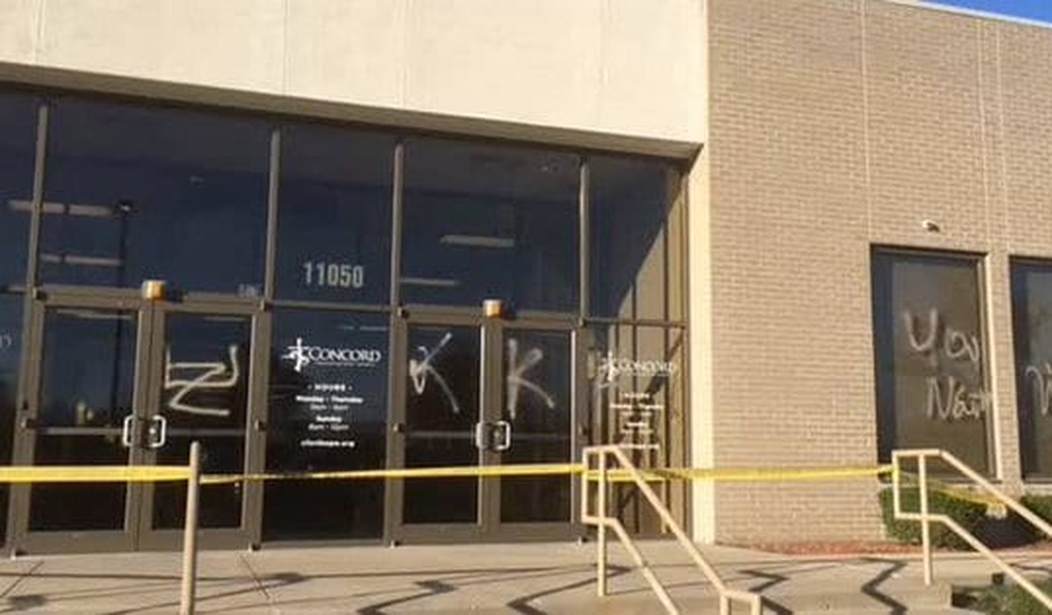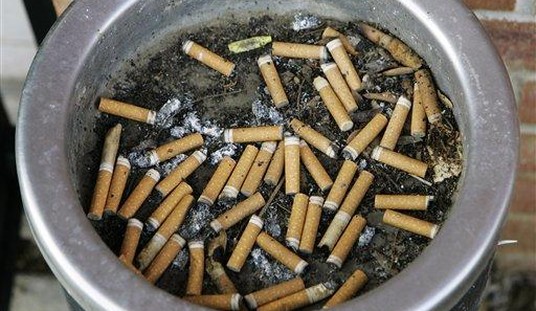Both San Francisco and Kansas City have seen racist vandalism in recent days that looked like the work of white supremacists but turned out to be the work of black men.
San Francisco was rocked by a series of vandalism incidents on BART property. The graffiti began appearing on October 20 and included several swastikas and racist slurs.
This morning, commuters discovered this swastika at Glen Park BART Station. Nazism & anti-semitism are alive & well. We have much work to do pic.twitter.com/816owd8Rsp
— Scott Wiener (@Scott_Wiener) October 27, 2017
Police are searching for the individual pictured below:
Full article:https://t.co/VlB0TXEtMj
— Far Left Watch (@FarLeftWatch) October 31, 2017
Authorities say that suspect is responsible for all of the vandalism due to similarities in the images and word choice.
In Kansas City, the media was aflutter after someone “broke into” a predominantly black church Sunday morning, started a small fire, and defaced the front doors and windows with racist graffiti. According to the Kansas City Star, the graffiti included “an ethnic slur directed at black people, the letters ‘KKK’ and what appeared to be an attempt at making a swastika.”
Fools think they're gonna keep us from worshipping this morning. pic.twitter.com/bCHhN8N93M
— Mayor Q (@QuintonLucasKC) October 29, 2017
Inside the church, police found that someone had entered the building, broke into a vending machine and the church’s financial office, and lit a chair on fire.
The fire caused minimal damage before being extinguished by the building’s sprinkler system, according to John Ham, a spokesman for the federal Bureau of Alcohol, Tobacco, Firearms and Explosives.
Ham said: “An attack on a church or an attack on a congregation is really an attack on everyone.”
Mayor Sly James weighed in on the alleged hate crime on Twitter:
This is the very type of cowardly act that is harming our nation, state and city. Come together #kansascity #fightracism and all “isms”! https://t.co/iP9ZRVTClc
— Sly James (@MayorSlyJames) October 29, 2017
The case was quickly resolved. The very next day the suspect — a church maintenance worker who was high on crack — was in custody. Nathaniel D. Nelson, 48, was charged on Monday with arson and remains in federal custody pending a detention hearing. He allegedly spray-painted the racist graffiti in an attempt to cover up his burglary.
Full article:https://t.co/MUZPzZfiwT
— Far Left Watch (@FarLeftWatch) October 31, 2017
KCTV 5 reported that one of the church cultural center’s video recorders “was unplugged and no longer recording when examined by investigators,” but a review of the DVR system showed that Nelson was in the foyer area shortly before the surveillance system was deactivated. According to the affidavit, a second DVR captured video footage of Nelson spray-painting the front of the church.
Nelson told investigators that “he went to his office in the cultural center to smoke crack cocaine sometime after 8 p.m. Saturday.”
At some point after getting high, Nelson said he went into the church office area and attempted to force his way into the finance office to steal money. The finance office was the only room in the church and cultural center he did not have keyed access. Nelson wasn’t able to break into the finance room so he proceeded into two adjacent offices using his key and took $140 from one office and $94 from another office. Nelson told investigators that he then left the church to purchase more crack cocaine.
Nelson stated that after he purchased four crack rocks for approximately $125, he returned to the church to get high a second time. After Nelson smoked the crack cocaine in his office, he said, he retrieved a pair of bolt cutters, a wrench and a drill bit and attempted to break into the vending machines located in the gymnasium of the cultural center. Nelson said he was only able to steal $2 from the vending machines.
Nelson told investigators that at some point after breaking into the vending machines he left the church to purchase additional crack cocaine from the same source. Nelson told investigators that after he purchased approximately four additional crack rocks he again returned back to the church to get high. Nelson said he only paid $75 for the additional crack cocaine with the promise that he would provide his source $200 in food stamps at a later time.
During the interview, the affidavit says, Nelson admitted to investigators that he intentionally unplugged one DVR system but did not know that video was being recorded on a separate system inside the church, which captured him spray-painting the outside of the building.
According to the affidavit, Nelson told investigators that he intentionally set a fire inside the office area of the cultural center using clothing and paper towels that he had laid on or next to an office chair. Nelson also told investigators he spray-painted the front of the church with inflammatory graffiti and intentionally set the fire to create a diversion and throw investigators off.
On Sunday, Kansas City-based media watchdog The Sentinel cautioned the local media to tread lightly on this story: “Media, Please Wait Before Denouncing KC Church Vandalism As ‘Racist.’”
As the Sentinel reported last week, the arrest of Eddie Curlin, an African American, for spray painting the walls of buildings on the Eastern Michigan University campus represented incident #322 on the site fakehatecrimes.org.
Two weeks before that arrest, University of Maryland Police arrested Ronald Alford, another black man, for painting swastikas on university walls. The announced motive in many of these crimes is not racist in any meaningful sense of the word, but political, the goal being to discredit white people and/or political conservatives.
The reasons these types of hoaxes proliferate is because the media fans the flames of racial paranoia with uncritical reporting. The alleged hate crime gets top billing on front pages, while the inconvenient truth about the culprit gets buried. At some point, they’re going to have to wise up and report these types of incidents with at least some degree of skepticism. Repeatedly having to wipe egg off their faces is embarrassing and damages their credibility with viewers. But far worse, their breathless reporting about alleged racial hate crimes also damages race relations and possibly contributes to genuine hate crimes, as we saw over and over again after the 2016 election.









Join the conversation as a VIP Member